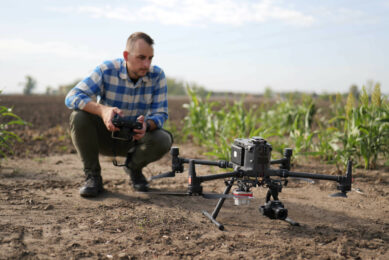XAG goes global with its P100 agricultural drone

Chinese drone manufacturer XAG makes its P100 agricultural drone available for sales globally. The fully autonomous drone can be used for crop spraying, fertiliser spreading and broadcasting seeds.
Vietnam was one of the first countries where the P100 agricultural drone was introduced. According to XAG, Vietnam is one of the fast-growing markets for agricultural drones. With the payload upgraded to 40 kg, the P100 agricultural drone can serve larger fields more effectively to address labor shortage. At the same time, many rural Vietnamese youth see becoming a drone pilot as an attractive career.
According to the World Bank, the number of agricultural workers in Vietnam has almost halved in recent decades. Young people in rural areas move to the city for a more decent job, and in face of rural aging, farmers complain that it is getting more difficult to hire workers to manage their rice fields.
Agricultural drone creates new jobs
XAG states the introduction of the agricultural drone provides a decent work opportunity for rural youth. It also speeds up the transformation towards a more sustainable agriculture. One example is the KPT Fly Team. This company was established in 2021 by a group of young engineers with experience in rice cultivation. They provide services to farmers in the Mekong River delta, using XAG’s drones to combat pests, sow seeds, and spread fertilisers.
According to Mr. Khuong, one of the founders of the KPT Fly Team, during the busy farming season, a drone pilot can earn up to 23.8 million VND (USD 1,003) monthly, which is far more than the average salary in Vietnam.
KPT currently has 16 operating pilots and has served over 5,000 hectares of rice fields. “The XAG P100 with its 40kg payload enables operations at a larger scale. By simply setting parameters on the mobile app, the drone can do its work autonomously with minimal human intervention,” said Mr. Khuong.
62-year-old Vietnamese farmer Le Thanh Nguyen was one of the earliest farmers in Vietnam to adopt agricultural drones in rice production. Read his story here.
Test flights to demonstrate efficiency
Vietnamese farmers are generally sceptical about the effectiveness of drones. To convince them, KPT carries out test flights in order to demonstrate the efficiency of for instance drone spraying compared to manual spraying. It shows farmers how much they can save on water and crop protection products.
“We make an agreement with farmers that if they use the quantities we recommend, and it is not effective, they will be compensated,” Mr. Khuong said.
Join 17,000+ subscribers
Subscribe to our newsletter to stay updated about all the need-to-know content in the agricultural sector, two times a week.



